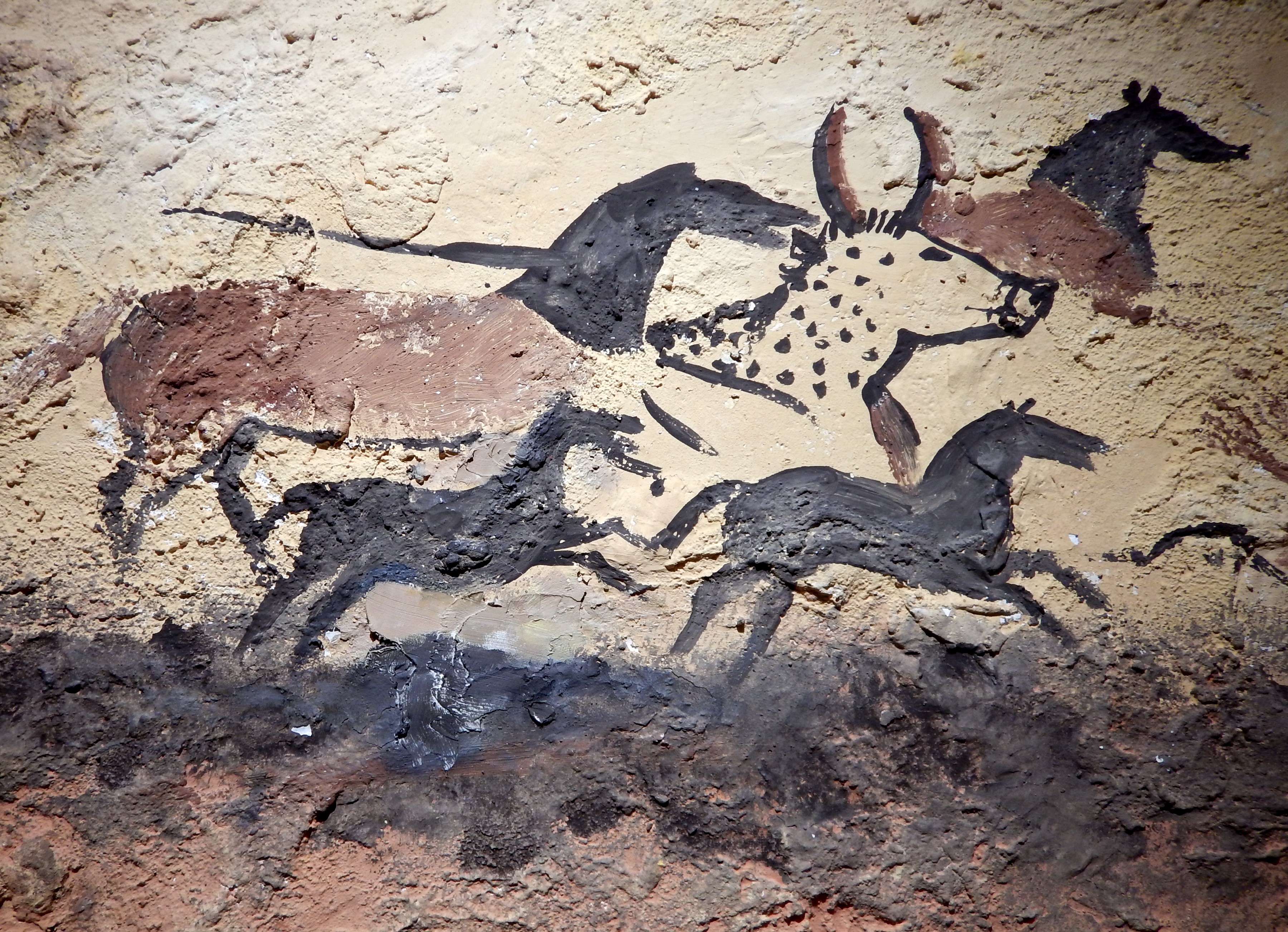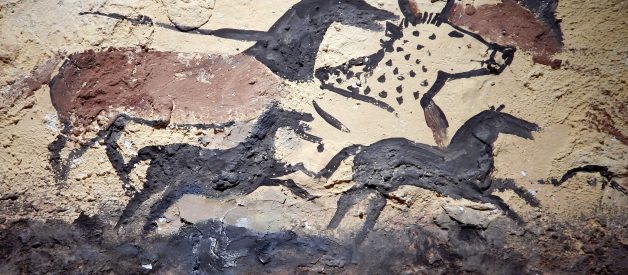The ups and downs of always wanting what we can?t have
Abstract: Humanity has a problem living in the now. If we aren?t lost in our memories of the past, we?re fantasizing about what the future might bring. But if we re-examine what we know of our earliest ancestors, we can see two things:
- We?ve had this problem for a long time. And,
- It doesn?t have to be such a bad thing.
 Photo Credit: subarcticmike
Photo Credit: subarcticmike
About 17,000 years ago, early man started doodling on cave walls in eastern France. Today, it?s a site we call Lascaux. It?s not the earliest example of humans making art. Not by a long shot. But that doesn?t stop it from being one of the most famous finds of our prehistoric past.
The caves were discovered by teenagers shortly after Paris fell to the Nazis in 1940. They were opened to tourists in 1948 and saw about 1,200 visitors daily. But as people marveled at the ancient artwork, they also contaminated it. Mold started to grow, leading to the caves being closed in 1963.
But in that time, what a buzz they stirred. People would gaze in wonder, lost in thought about how different it must have been back then.
But what they should have been thinking about is how little we?ve changed since.
The care and feeding of early homo sapiens sapiens
Among the paintings at Lascaux, 900 of them are of animals. And 605 of these can be identified with some precision. Animals depicted include 364 horses and 90 stags. There are also cattle and bison. Some wild cats, too. Plus a bird, a bear, and even a rhinoceros.
But of all the animals on those cave walls, there?s not one reindeer.
So what? Well, just as rhinos used to roam wild in France, so did reindeer. Herds and herds of them. There were so many reindeer, they became a mainstay of early man?s diet.
We know from animal bones found at settlements from that time that they ate reindeer meat. And lots of it. Over 90% of the time.
So, when their artists took to the walls with pigment, they weren?t painting the everyday. Some have suggested as much, but the evidence doesn?t back it up.
Rather, they could have been daydreaming. Imagining what life could be like if only they were fast enough to take down bigger game. How well they?d eat if they only had more effective weapons. How wonderful their lives would have been if only this one thing were different.
Sound familiar?
Maybe dissatisfaction with the current state of our lives is not a product of the modern age. Perhaps we?ve always wanted something more. Like we?ve never been happy with what we have.
So why were they compelled to paint?
Henri Breuil was one of the first people to examine Lascaux. Also a Catholic priest, he saw the art as a part of ritualized hunting magic. In his mind, this is the very birthplace of ancient religion.
By painting animals, early man hoped to increase the herds? numbers. Maybe they ate so much reindeer because those herds were most plentiful. They may have preferred to hunt other animals that were more scarce.
Scarcity has long determined an objects inherent value. It?s a central tenant of the law of supply and demand. If gold lay about everywhere, would it still be so valuable? Not bloody likely.
Our long history of desire
At times, our history seems like nothing more than a record of wanting more. More wealth, more power, more territory. More anything and everything. Just give me more of it.
Our greatest thinkers have long suggested that it is in longing that we create our own suffering. The Buddha decreed that desire is the very root of our misery. We create it ourselves by obsessing over what we can?t have. In ancient Rome, Seneca said we suffer more in our minds than we ever do in reality. Even St. Augustine had something to say on the subject . . .
Desire hath no rest, is infinite in itself, and as one calls it, a perpetual rack or horsemill.
Delightful image, but he?s not wrong. This is the hell we put ourselves through daily.
Hedonic forecasting
Their wishful thinking made cave painters our first hedonic forecasters. At least as far as recorded history is concerned. By having the gall to imagine a better future they opened the door to a world of mental anguish.
We all know at least one person who?s great at hedonic forecasting. They?re likely someone who?ll tell you they have no imagination. Literally none. They don?t consider themselves creative. At all.
But ask them how their lives would change if they won the lottery . . . and look out. It turns out they?ve got a vivid imagination after all.
But you can?t buy happiness
The downside of all that wishful thinking is the hedonic treadmill. That?s a fancy term from psychology. It means that when our fortunes change, we stay the same. The chronically depressed get rich and they?re still depressed.
It?s like the horsemill alluded to by St. Augustine. It turns out we keep going in circles. When our luck changes, we don?t. We?re still the same needful people we always were.
The moment we get something, our minds start looking for the next thing. Did this happen in Lascaux, too? What did it feel like when the cave painters first brought down a horse? I?ve never tasted reindeer or horse meat, so I can?t say for certain. But it wouldn?t surprise me if the thrill of the hunt was quick to wear off for them. How cold did the leftovers get before the hunters started wondering what it would take to take down a bull?
Reversals of fortune, both good and bad
A well-known study looked at the happiness of recent lottery winners and paraplegics. Common sense would dictate that the newly rich should be happier than they used to be. But instead, after the immediate shock wore off, they felt about as happy as they ever were. If they had been miserable before, being rich hadn?t filled their hearts with glee.
Conversely, you?d expect a person who?d recently lost the use of their legs to be devastated. But that?s not what this study found. Sure, the recent paraplegics were prone to periods of nostalgic sadness. Such a sudden change in basic mobility has to be a big shock. But most of the participants said they fully expected to adjust and return to normal soon. They were already improving and could see themselves being as happy as they had been before.
Meanwhile, some of the lottery winners reported something different. They were finding that simple pleasures were now more elusive. That the everyday was now a little more depressing.
It?s got to make you wonder if we?re ultimately better programmed to deal with loss than gain.
Wanting more doesn?t have to mean being selfish
The greatest thing about desire is that we also have the capacity to want things for other people. For our friends and family. For our colleagues and employees. Our fellow citizens. The human heart is almost infinite in its potential to care about others.
I don?t think cave paintings reflect man?s selfish nature at all. Sometimes, our desire for more money is driven by a need to care for others. To ease their suffering by taking care of their financial worries.
My mom was like that. Never a rich woman, she always had something to give. She never won the lottery, but she played all the time. She tracked the jackpots so she?d know how much she?d give away when she won.
She would take care of us all, she said. If my ship ever comes in, she?d say. We just had to promise the first thing we?d buy would be snow tires. Safety first and all.
Sure, the odds were against her. But I knew that if that day ever came, her share would be no bigger than mine.
Prehistoric Art, reconsidered
That?s what I see in the cave art of Lascaux. A mother looking to provide for her children. A chieftain looking to make things better for their people. That desire to better ourselves by helping others. To make sure no one goes hungry or has reason to want for more.
I could be wrong. Maybe the person who dreamed of taking down that rhino was trying to impress someone. Maybe they were trying to get laid. But I doubt it.
We?ve made marvelous advances toward equality in the last century. Not because people want more for themselves, but because they want more for everyone. Equal opportunity, universal suffrage, and no one left behind.
It?s not a new thing. At its core, our progress is something we?ve inched towards for millennia. From Buddha to Ghandi. From Martin Luther to Martin Luther King, Jr.
When I think of Lascaux, I don?t wonder at the differences. I look for the similarities. That burning desire within that keeps us striving for more, for ourselves and others. The very thing that defines us as a species.


